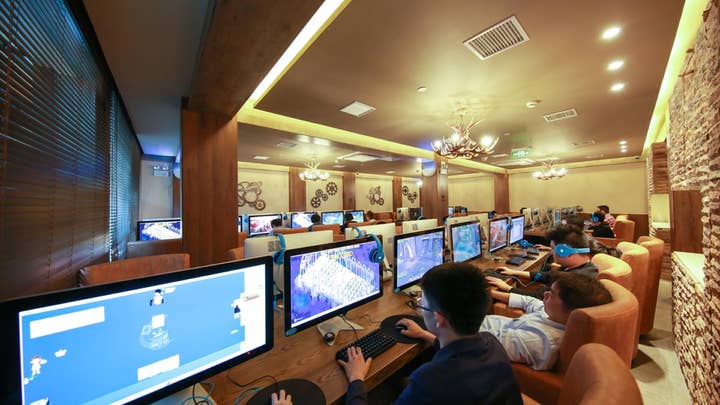Reaching Chinese gamers through internet cafés
Green Man Gaming explains how its new partnership can help Western games firms crack the world's biggest market
Digital retailer Green Man Gaming has just signed a deal that could give publishers and developers around the world a surefire way to reach Chinese gamers -- without having to worry about the nation's famously strict and lengthy approval process.
The company has partnered with Hangzhou ShunWang Technology to add its entire store portfolio to the Chinese firm's platform, which will make it accessible through internet cafés in China, Malaysia and South Korea.
ShunWang provides the software used to run 80% of China's internet cafés and over 60% of those in Malaysia and South Korea, which is accessed by an estimated 140 million people. Adding the Green Man Gaming store, including all of its titles, gives Western publishers and developers "significant exposure" to audiences in these regions, according to Green Man Gaming CEO Paul Sulyok.

"Those cafes are, dare I say it, the social hub of many towns for young people in China," he says. "They don't have the parks or public open expanses we've got. If you go to South-East Asia, you'll see one high-rise block with 5,000 people in it right beside the next, and the next. The density of population is huge.
"People also tend to leave home a lot older than they do in Western Europe, so they don't have that private space in order to sit down, fire up a game of Call of Duty, and be able to talk to their mates. So they congregate in internet cafés."
Customers who use these cafés rent a PC each time they visit, but the software they play is all owned by them -- no different to if they bought a game through Steam or another digital store at home. China's superfast broadband then allows them to install it on the café machine and play for however long they're renting for.
China has been the world's biggest market for video games for several years now, but Western firms have encountered difficulties releasing their products in the region -- in part due to a strict approval process that takes into account whether the content aligns with China's cultural sensitivities and its government's regulations.
This process was further complicated by a six-month freeze on all new approvals as China restructured the system evaluating each video game release, resulting in new guidelines for developers and publishers to follow.
However, Sulyok clarifies that this process only applies "if you want to sell down certain channels" -- any title available through Green Man Gaming's store is automatically available for sale in ShunWang-powered internet cafés. The retailer has already been selling its entire catalogue to China for a couple of years now, with hundreds of thousands of established customers in the region -- and it helps that ShunWang is partially owned by the Chinese government.
"If you are interested in penetrating the Chinese market, you have to understand what the social norms are and how to play to them"
"China is one of our fastest-growing markets," he explains. "The US is our largest market, China is now our No.2 when it comes down to customers working with us. That's gone from a standing start to a significant sized market in just two years, and I'd say we've not even scratched the surface of it. There's so much potential. Gaming over there is so much more mainstream than it is in Europe or North America. The potential demand there is significant.
"The reason ShunWang came to us is because so many people were already opening up Green Man Gaming's store in ShunWang browsers on their machines. This just makes it easier."
Green Man Gaming has also been working closely with its new partner to better facilitate Chinese customers. The retailer already has a fully localised Chinese website and supports popular payment systems such as AliPay and WePay, but it's also working on integrating WeChat single sign-in logins. The hugely popular social network is essentially China's answer to Google and Facebook, and its accounts can be used to log in to other sites just as you do with those of the two Western giants.
Sulyok says Green Man Gaming will also be experimenting with how it can improve discoverability for games in the region. Rather than just translating the Western version of its marketplace, Green Man Gaming will have a unique storefront for ShunWang-powered devices. This can be customised for different territories, whether it's tweaked for China, Malaysia and South Korea or even specified to a particular town.
"Where we see a certain product gaining traction, we can put that front and centre in certain territories," says Sulyok. "We can have as many shopfronts in countries as we want, so we'll have different shopfronts to cater for the tastes and habits of Chinese [customers]."

Of course, simply adding your game to Green Man Gaming's store is no guarantee of success in China. Developers and publishers will need to market their products to that audience, naturally, but there are other barriers that have prevented Western games from taking off in the region.
Aside from the approval process, one major hurdle is localisation. But while there are plenty of translation specialists out there, adjusting a game to suit the Chinese audience, for example, requires a broader reevaluation.
"You need to look at the cultural prerequisites," says Sulyok. "Some Asian markets don't really like games with guns that much -- I met someone from Vietnam's Ministry of Information once that told me it's because it makes the old people cry. [You need] that level of subtle awareness of what the cultural standards are. They like fantasy, and maybe there's another generation that's coming through now who are all playing Counter-Strike, but there are certain things in certain territories that you just need to be aware of -- how the mindset works, what people are looking for in certain territories, what they enjoy, how they play."
He offers the example of internet cafés. It would be easy to assume players sit in near silence, hunched over their machines for hours at a time, but Sulyok reiterates that these are social hubs. More likely each player is talking to their friend next to them, in between shouting over to someone on the other side of the room and communicating with other players online.
"Gaming in the West is quite often a solitary experience," he says. "Yes, you're connected via Discord and everything else, but it's not a physical experience. Whereas gaming in Southeast Asia, and particularly in China, is a physical experience. You don't play it at home on your own, you play it with your mates, you have some food, order some drinks, and might even spend half an hour watching your mate play a game. It's much more of a social experience.
"If you are interested in penetrating the Chinese market or the Southeast Asian markets, you have to understand what the social norms are and you have to understand how to play to them as well. There are some games that just smash it anyway, but the mechanics and structure of the game go above and beyond just localising it and translating it.
"Yes, you have to do that, but there are some really good companies out there, some great localisation outfits -- they can translate the thousands of words in your game, but it's more than that. It's the cultural approach, understanding what's going to get traction and testing that market before you just jump in with both feet. Otherwise you're just leaving it up to chance."
